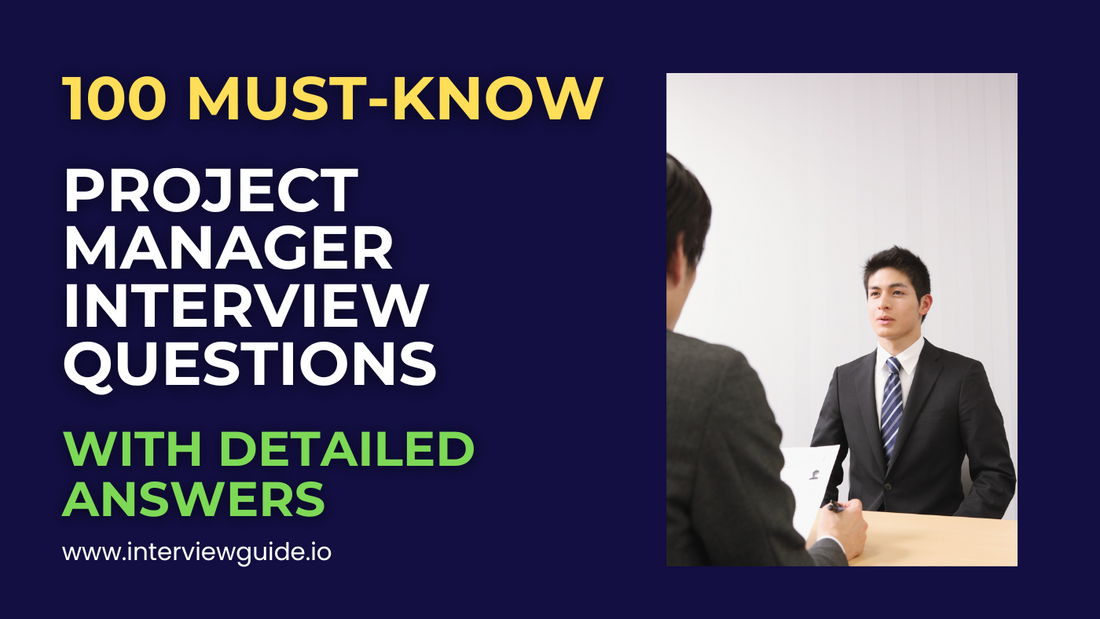
100 Project Manager Interview Questions & Answers
Share
Preparing for a Project Manager job interview? Whether you’re pursuing a role in construction, IT, healthcare, or any other industry, it’s essential to demonstrate not only your technical expertise but also your leadership, communication, and problem-solving abilities. Employers want project managers who can plan effectively, manage cross-functional teams, stay within budget, and deliver results on time—often under pressure.
In this article, we’ve compiled 100 of the most common Project Manager interview questions, along with sample answers to help you stand out. From questions about project lifecycle and risk management to stakeholder communication and handling scope changes, this comprehensive guide will help you walk into your interview confident, well-prepared, and ready to lead. Let’s dive in!
1. Tell Me About Yourself And Your Project Management Experience
I have over seven years of project management experience across various industries, including IT and healthcare. My expertise lies in leading cross-functional teams, managing budgets, and ensuring projects are completed on time. I am proficient in Agile and Waterfall methodologies, which allows me to adapt my approach based on project needs. I have successfully managed projects of varying sizes, from small-scale implementations to large enterprise solutions, always focusing on stakeholder satisfaction and delivering high-quality results. My passion for continuous improvement drives me to refine processes and methodologies regularly.
2. What Types Of Projects Have You Managed? (Size, Industry, Complexity)
I have managed a diverse range of projects across various industries, including technology, healthcare, and finance. My experience includes overseeing small-scale projects with budgets under $100,000, as well as large initiatives exceeding $5 million. Complexity varies from straightforward software deployments to intricate system integrations requiring coordination among multiple teams and stakeholders. I am adept at navigating challenges, whether they stem from tight deadlines, regulatory compliance, or evolving project scopes, ensuring successful delivery and stakeholder satisfaction.
3. What Project Management Methodologies Are You Most Familiar With?
I am most familiar with Agile, Waterfall, and Hybrid methodologies. Agile has been my primary approach, particularly in software development projects, allowing for flexibility and iterative progress. I have experience with Scrum and Kanban frameworks, which facilitate collaboration and continuous improvement. Waterfall, on the other hand, has been effective for projects with well-defined requirements, particularly in construction and manufacturing. The Hybrid approach enables me to tailor methodologies based on project needs, combining the structured phases of Waterfall with the adaptive nature of Agile for optimal results.
4. How Do You Define Project Success?
Project success can be defined by several key criteria. Firstly, achieving project objectives within the agreed-upon scope and budget is essential. Meeting deadlines is also critical, as timely delivery can impact stakeholder satisfaction. Additionally, stakeholder engagement and approval play a significant role. A project that enhances team morale and fosters collaboration is often deemed successful. Ultimately, long-term benefits, such as improved processes or increased revenue, contribute significantly to the perception of success, ensuring that the project aligns with the broader organizational goals.
5. What’s The Largest/Most Complex Project You’ve Managed?
In my previous role, I managed a $5 million software development project for a healthcare system. This project involved coordinating a cross-functional team of 20 members, including developers, designers, and stakeholders from various departments. The complexity arose from stringent regulatory requirements, tight deadlines, and the need for seamless integration with existing systems. I employed Agile methodologies, which allowed for flexibility and continuous feedback. This approach enabled us to adapt to changes quickly, resulting in a successful launch that improved patient management and increased efficiency across the organization.
6. How Do You Handle Unrealistic Deadlines?
Handling unrealistic deadlines involves clear communication and assessment of project requirements. First, I engage with stakeholders to understand the rationale behind the timeline. If the deadline seems unfeasible, I present a realistic estimate based on team capacity and project scope. I suggest alternatives or phased approaches to meet critical deliverables while maintaining quality. Additionally, I prioritize tasks and focus on essential features, ensuring that team members are not overwhelmed. Keeping stakeholders informed about progress and any potential risks allows for collaborative adjustments when necessary.
7. Describe A Project That Failed. What Went Wrong, And What Did You Learn?
A project I managed aimed to implement a new customer relationship management system. Initially, the team underestimated the complexity of integrating existing data and processes. Insufficient communication with stakeholders led to misaligned expectations and scope creep. As a result, we missed key deadlines and exceeded the budget. This experience taught me the importance of thorough planning, continuous stakeholder engagement, and the necessity of setting realistic timelines. I now prioritize regular check-ins and clear documentation to align goals and expectations, significantly improving my project management approach.
8. How Do You Prioritize Tasks In A Project?
In prioritizing tasks, I utilize a combination of methods such as the Eisenhower Matrix, which helps distinguish between urgent and important tasks. I first assess project goals and deadlines, then classify tasks based on their impact on project objectives. Regular communication with stakeholders and team members ensures alignment and transparency. I also take into account dependencies and resource availability, adjusting priorities as necessary. This dynamic approach allows for flexibility in responding to challenges while maintaining focus on critical deliverables.
9. What Project Management Tools Have You Used? (Jira, MS Project, Trello, Etc.)
In my project management experience, I have utilized various tools tailored to specific project needs. Jira has been instrumental for Agile projects, providing robust tracking for user stories and sprint planning. MS Project has helped in detailed scheduling and resource allocation, ensuring timelines are met. Trello has been effective for visual task management, especially in collaborative environments. Additionally, I have experience with Asana for tracking project progress and Slack for team communication. Each tool has its strengths, allowing me to adapt my approach based on project requirements.
10. How Do You Ensure Projects Stay Within Budget?
To ensure projects stay within budget, I start by developing a detailed budget plan during the project planning phase, incorporating all potential costs. Regular monitoring of expenses against the budget allows me to identify any deviations early. I also implement contingency reserves for unforeseen expenses, maintaining flexibility while adhering to financial limits. Engaging the team in budget discussions fosters accountability, and I encourage proactive communication about potential cost impacts. Periodic budget reviews with stakeholders ensure alignment and address concerns promptly.
11. How Do You Motivate Your Team During Challenging Projects?
Motivating a team during challenging projects involves creating an environment of support and encouragement. I prioritize open communication to understand individual team members' concerns and challenges. Celebrating small wins boosts morale and reinforces progress. I also set clear goals and ensure everyone understands their role in achieving them. Providing opportunities for skill development and recognizing achievements fosters a sense of ownership and accountability. Regular check-ins help maintain focus and address any obstacles, ensuring everyone feels valued and engaged throughout the project lifecycle.
12. Describe Your Leadership Style
My leadership style is predominantly collaborative and supportive. I believe in empowering team members by fostering an environment where everyone feels valued and heard. I encourage open communication, enabling my team to share ideas and concerns freely. I prioritize setting clear expectations while providing the necessary resources and guidance to achieve project goals. By recognizing individual strengths, I delegate tasks effectively, ensuring that each member can contribute meaningfully. This approach not only enhances team morale but also drives collective success in challenging projects.
13. How Do You Handle Conflicts Within Your Team?
Conflict resolution is essential for maintaining a productive team environment. I first seek to understand the perspectives of all parties involved, creating a safe space for open communication. Active listening plays a significant role here, as it helps me identify the root cause of the conflict. I then facilitate a discussion where team members can express their concerns and work collaboratively towards a resolution. Encouraging compromise and focusing on shared goals often leads to effective solutions. After resolving the conflict, I follow up with the team to ensure that the resolution is upheld and that relationships remain strong.
14. How Do You Delegate Tasks Effectively?
Effective delegation involves understanding both the strengths and weaknesses of team members. I start by assessing the skill sets of each team member and aligning tasks with their expertise. Clear communication of expectations, deadlines, and the importance of the task is crucial. I also provide the necessary resources and support while allowing team members the autonomy to approach the task in their own way. Regular check-ins help track progress and provide opportunities for feedback, ensuring that everyone stays aligned and can address any challenges that arise during the project.
15. What Do You Do If A Team Member Is Underperforming?
When a team member is underperforming, I first address the situation with empathy and understanding. I schedule a one-on-one meeting to discuss any challenges they might be facing. It's important to listen actively and create a safe space for them to share their concerns. Based on the conversation, I collaborate with them to set clear, achievable goals and provide appropriate resources or support. Regular check-ins help monitor progress and offer feedback. If the issue persists, I may involve HR to explore further options, ensuring that the process is fair and constructive.
Click here to download all 100 questions and answers as a PDF
